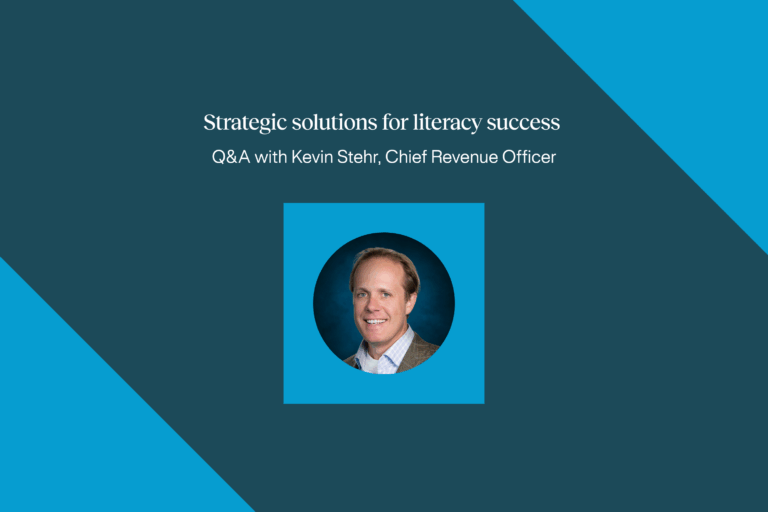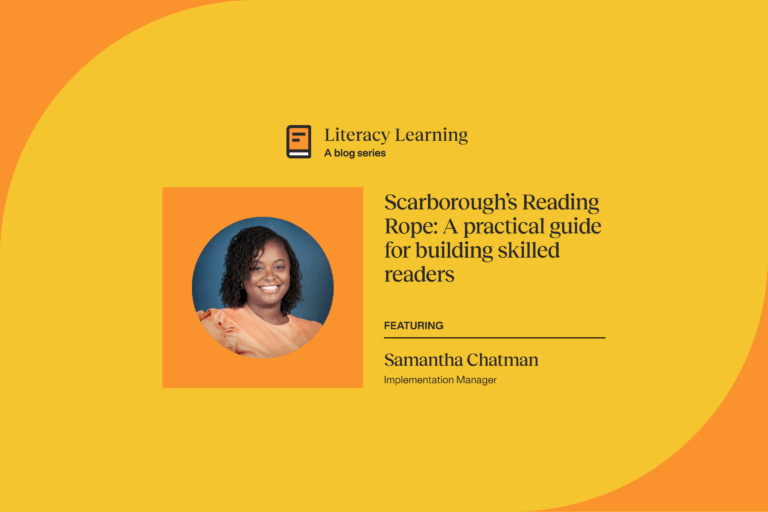Why is reading important? The lifelong benefits of reading

The importance of reading can be a hot button topic. When you bring it up, it tends to cause one of two dramatic reactions in adults—both of which probably come from thoughts of their childhood experiences. What is it about reading? Some people will get a dreamy look in their eyes and tell you about the hours they can spend curled up with a book, in a different world, or with a highlighter, dog-earring pages to revisit. For others, they glaze over a bit, and you can almost see the confidence drain out of their body. “Reading was hard,” they’ll tell you. “I still don’t think I’m a good reader.”
I’m sure you can relate to one or the other, or maybe both depending on your experience. For some, reading comes easily, they receive and process sound and print associations and can move quickly into more sophisticated structure and content. For many others (more than we previously thought), their teachers did the best they could, but perhaps didn’t have the training to offer the direct instruction they needed to really understand the nuances of spoken and written language and how to decipher it. For still others, they had something standing in their way—whether they knew it or not. And sadly, maybe some gave up.
The body of research called the science of reading now helps us understand that virtually all children can learn to read with the appropriate evidence-aligned, direct instruction. And the benefits of being a fluent reader are far greater than just feeling confident in school. So why is reading important? Reading is a lifelong skill that improves memory, builds a robust vocabulary and foundation of knowledge, and adds a richness and depth of meaning to life for all those who can access true, deep comprehension.
How does reading affect the brain?
We all understand that one of the benefits of reading more is that you might know more factual information or understand something more deeply. But as it turns out, reading doesn’t just fill your head with information, it actually changes the wiring in your brain.
One of the significant ways reading affects the brain is through perspective taking. When you read and find yourself thinking about the characters in the book as if they are real people, with perspectives possibly very different than your own, it allows for growth of emotional intelligence and empathy. When your brain is deeply engaged in reading, you have a huge increase in brain activity—and not just in the language centers.
According to Maryanne Wolf, literacy scholar and professor of childhood development, deep reading literally nourishes our capacity for attention, empathy, and insight.
“At a basic brain level, we really do experience the same thing the characters do. We don’t just understand a book—on a neurological level, we live it. When we read fiction, the brain actively simulates the consciousness of another person, including those whom we would never otherwise even imagine knowing. It allows us to try on, for a few moments, what it truly means to be another person,” Wolf sums up.
Deepening of empathy is the first benefit of reading on our list. Keep reading to see the other ways in which frequent and deep reading adds so much value over the course of a lifetime!
13 Benefits of reading
1. Reading helps to develop empathy and foster connection with perspective taking
You can never fully understand what it’s like to be in someone else’s shoes. But having empathy means you can feel what it might feel like to be in their situation. Or maybe you’ve experienced something similar and really do know what that particular event feels like. When we are deeply involved in a story, even if we don’t agree with many of the characters’ thoughts, actions, or words, we are called to consider their perspective. Believe it or not, this type of practice actually does transfer to real life situations. And frequently, connecting to a character’s differing beliefs can help you do just that in real life.
They say you can never know a person until you walk a mile in their shoes. But here is a place where you can definitely see the importance of reading. Getting lost in a book is another excellent way to see the world from a different perspective. Even if you disagree with the author on every single page, you’re at least taking the time to hear and consider alternate points of view. And more often than not, you’ll find that reading about personal experiences can be a trigger to change your own mindset.
2. Reading improves critical thinking skills
Given the availability of all kinds of information via the internet, people might be asking, “Why is reading so important if I can just google it?” Google might give you a lot of information—sometimes factual and sometimes not, but it doesn’t tell you how to think. Building critical thinking skills is more important than ever for our children. Especially if they are using the internet. Critical thinking, or the ability to think deeply about a topic, question or idea, is a skill that needs to be practiced like any other.
When children spend a lot of time reading, they strengthen their ability to think about something from another point of view and to problem solve for someone outside of themselves. Finding solutions to a character’s problem helps children to think through other issues around them with similar discernment.
3. Reading builds vocabulary authentically and enhances conversation skills
The more time kids spend reading grade-level text, the more likely they are to authentically learn new words. This is true for both books that children read independently and those that are read aloud to them. In fact, reading aloud with children allows for exposure to sophisticated language and content that might be above their independent reading level, but not above their interest level. Not only is it a great way to bring in new vocabulary, it also keeps younger children interested in reading when they are still working towards being able to access higher level text. Additionally, engaging children in dialogic reading, or authentic conversation about the book as we read helps them to understand how to talk about reading and gives them language to be able to try out these types of conversations on their own.
4. Reading teaches social skills and allows for “rehearsal” of universal experiences
Often, informational text or nonfiction books are revered for their learning value in the classroom. But the truth is that reading fiction allows for a whole different set of skills to be developed and strengthened. When kids read about characters they love, they experience the things their characters go through almost as if it is them. Here we see a huge reason reading is important.
Research tells us that when we read about a certain experience or activity, our brain lights up in the same places as when we actually experience those things. This means children can almost practice going through feeling certain feelings or maybe even their first experiences with empathy, teaching them that they can imagine what it’s like to be in someone else’s shoes.
5. Reading strengthens cognitive processes
Cognitive processes help us learn new things. Neuroscientists say that reading actually strengthens your brain, even after you’ve moved on to something else. The more you read, the more parts of your brain activate, with lasting effects. Engaging in reading consistently bolsters cognitive processes because it exercises our brains, enhancing critical thinking and analytical skills.
Thinking through complex plots or understanding character motivations helps to foster problem-solving skills, encouraging readers to make connections and draw conclusions. Over time this can lead to improved memory retention, better concentration, and overall, more capacity for in-depth reading comprehension.
6. Reading is important because it helps to build background knowledge
Decades of research has shown that when it comes to reading unfamiliar texts, or reading to learn (as children experience in the upper elementary grades), the more background knowledge they have on a subject, the easier it will be for them to anchor new information to concepts they already have some knowledge of. This is sometimes referred to as Schema Theory, the idea that “comprehending a text is an interactive process between the reader’s background knowledge and the text.” The more you know, the easier you can learn new information.
7. Reading can help reduce stress for all ages
Here’s an incredible statistic: reading for as little as six minutes can decrease stress up to 68%. When you read, you distract your brain from the problems of the day. This allows your muscles to relax, decreasing blood pressure and heart rate. Reading a book is more effective at reducing stress than listening to music or even taking a walk. Studies on brain activity while reading tells us that reading can have the same effects on our brain and body as meditation in many ways. The brain is in a focused state, very similar to a mindfulness practice, reducing stress levels and promoting relaxation. This escape into a book not only offers a break from daily stressors but also helps cognitive function and encourages mental clarity—very similar to the benefits you might get from a regular meditation practice.
8. Reading can improve sleep
Reading can improve your sleep? Seems strange, but it’s true! In this age where devices rule, picking up a book at bedtime instead of watching TV or doing something on your phone is an easy way to help your brain power down and cue your body that it’s time for sleep. When we engage on anything with a screen before bedtime the bluelight it emits can interfere with the production of melatonin which helps us to naturally become tired and fall asleep. On the other hand, reading is an activity that works your brain without active physical stimulation, because you can read while lying down. It slowly relaxes your body and mind into sleep.
9. Reading helps to build and maintain memory
When you read, your brain actively encodes and stores information, creating new connections between neurons. Visualizing scenes, characters, and details from a story engages the brain’s sensory regions, enhancing memory retention through vivid mental imagery. Additionally, the act of repeatedly encountering words, phrases, and concepts while reading reinforces memory pathways, leading to improved recall and retention of information in the long term. According to research, reading strengthens the white matter in your brain, making it easier to concentrate. White matter functions as insulation, wrapping around long nerve cell wires—this serves as communication connections between brain cells.
10. Reading strengthens writing skills
Reading and writing are impossible to separate from one another. The practice of one undeniably improves the skills of the other. For children, reading offers them a window into how authors write. It offers a study in different genres, styles, tones, and use of different vocabulary words. It can also be a creative spark for children who otherwise might have difficulty coming up with their own ideas to write about.
11. Reading also strengthens language and communication skills
This one doesn’t seem as obvious, but it’s true! Researchers note that reading and speaking involve many of the same parts of the brain. In fact, reading is one of the most effective ways of boosting word recognition and comprehension, and of learning a foreign language.
12. Reading builds sturdier problem solving skills
To solve problems in everyday life, we have to identify the issue clearly, analyze the causes, and come up with creative solutions. Reading teaches all of these skills! Reading comprehension is all about understanding what’s happening in a story, then analyzing and evaluating the events and characters’ actions. Plus, when we read, we’re exposed to new ideas constantly, which can help us innovate when we need to solve problems.
13. Reading can provide a sense of support and belonging—particularly for those who might feel “on the outside”
As connected as we are these days, it’s also easier than ever to feel alone. For kids who are going through a hard time (at school, with friends, with a teacher, or with their parents or caregivers) this is especially true. One of the things reading offers is relatability and a reminder that we are not the first or only person to feel this way. Whether fiction or nonfiction, stories help us to process our own experiences—to feel seen and understood when this is missing in our real lives.
Tips for making reading more enjoyable
By now, it’s easier to see why reading is important. But for some kids, reading is really challenging. When reading feels difficult, it’s hard to enjoy it! Help kids find their love of reading with some of these tips:
Read aloud to all kids: little or big! When you read aloud to kids, it’s sometimes easier for them to access the storyline. This is especially true for kids that are having trouble with some of the foundational reading skills. Hearing you read aloud helps them to stay interested in books at a higher level and also models for them what reading should sound like with regards to fluency, expression, and prosody (the patterns of intonation and syllable stress in spoken language).
Look for books that reflect your kids’ interests. Do you have sports fans or truck lovers? Maybe you have budding artists or animal activists. Whatever their interests, they are more likely to be excited about reading if it’s a topic they love!
Help your readers notice information as you read. Point out new words and phrases or ask them what they think a character will do next or how something makes them feel. Engaging with the story and with unfamiliar language helps kids to understand that reading is more like a conversation with the author than a one-way activity.
Get your kids a library card. There’s nothing like roaming the library looking through shelves and getting cozy to have a look at something before you check it out. Share this experience with your kids and then give them ownership over their library card!
Get them hooked into a series. Once you know what your kids are interested in reading, look for a series that involves these things. Finding a series your kids love means they will be excited to get through one so they can move on to the next! Keep reading for some ideas on great series!
Popular book series to begin reading
Finding a good series of books is like finding the pot of gold at the end of the rainbow. Here are a few series to get you started:
- Grades K-2: Magic Treehouse books, Frog and Toad books, Judy Moody, Stella Diaz Series
- Grades 3-6: Harry Potter Series (books get more intense as the series continues so knowing your child and what they can handle is important here!), The Chronicles of Narnia, Addison Cooke series, Ranger’s Apprentice series, The Giver Quartet
- Grades 7-12: Project Nemesis Series, Red Rising Series, Miss Peregrine’s Home for Peculiar Children
The final word
Reading isn’t just about learning. Some of the reasons why reading is important is to foster a relaxed, inspiring, and enjoyable life filled with incredible stories, relatable characters, and the ability to broaden or deepen your knowledge just by picking up a book.
If you are looking for a comprehensive tool kit to help unlock foundational reading skills for all children, 95 Percent Group™ is your one stop shop for whole group Tier 1 Instruction, small group Tier 2 and Tier 3 intervention, or the new Literacy Intervention System. We also offer strategic coaching and professional learning to help launch a change in the way kids learn and teachers teach.
Learn more
Are you interested in learning about how you can bring an effective and efficient structured literacy approach, grounded in the science of reading, to your school or district? Contact us today.



